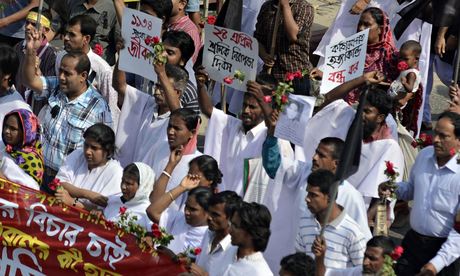Conscienceless Profit
"We cannot leave all those victims. We really hope that they would come forth and really collectively recognize the need to compensate the people, though they may not be legally responsible."
Gilbert Houngbo, deputy director-general, International Labour Organization
"Brands are failing Rana Plaza victims, and they need to pay up now."
Jyrki Raina, general secretary, IndustriaALL Global Union
"I have no money, and I need it badly. I've heard many promises from the government but haven't received anything from them."
Bulbuli Akter, 23, former Rana Plaza factory worker

Campaigners and
relatives of the victims of the Rana Plaza building collapse donned
funeral shrouds as they took part in a protest to mark the first
anniversary of the disaster. Photograph: Munir Uz Zaman/AFP/Getty Images
Over 1,500 of the surviving workers were injured in the collapse, and of that number roughly one thousand surveyed by the aid group Action-Aid Bangladesh are unable to hold jobs as a result of physical failings, trauma, or through employers unwilling to hire them. The government of Prime Minister Sheikh Hasina called for donations to a a victim relief fund.
-
Fatema holds a picture of her son Nurul Karim in front of her slum house in Savar. Fatema lost her son and her daughter Arifa, who were working on the fifth floor of Rana Plaza when it collapsed.
(ANDREW BIRAJ/REUTERS)
The International Labour Organization has raised less than half of its $40-million goal to help the victims. That $40-million represents a minuscule fraction of profits earned by leading retailers whose products result from factories such as Rana. The U.S. and other countries have demanded Bangladesh employ stricter safety standards in a country known as having the world's second-largest garment industry.
Worker wages remain among the world's lowest for garment workers supplying retailers like Hennes & Mauritz and Walmart. The government of Bangladesh raised the minimum monthly wage by a whopping 77% to result in a final minimum monthly wage of about $70. The ILO trust fund has received $15-million to date representing less than 0.1 percent of an estimated $22-billion annual profit enjoyed by 29 brands sourcing garments from such low-cost producers.
Fifteen brands have not yet contributed funds. Those brands include the Benetton Group and Carefour, according to the website of Switzerland-based UNI Global Union. Three groups have started factory inspections since Rana Plaza collapsed, backed by companies including Walmart and H&M, along with the Bangladeshi government and the ILO.
Across greater Dhaka alone there are almost 5,000 factories to be inspected.
Labels: Bangladesh, Crisis Politics, Manufacturing, Profit

<< Home